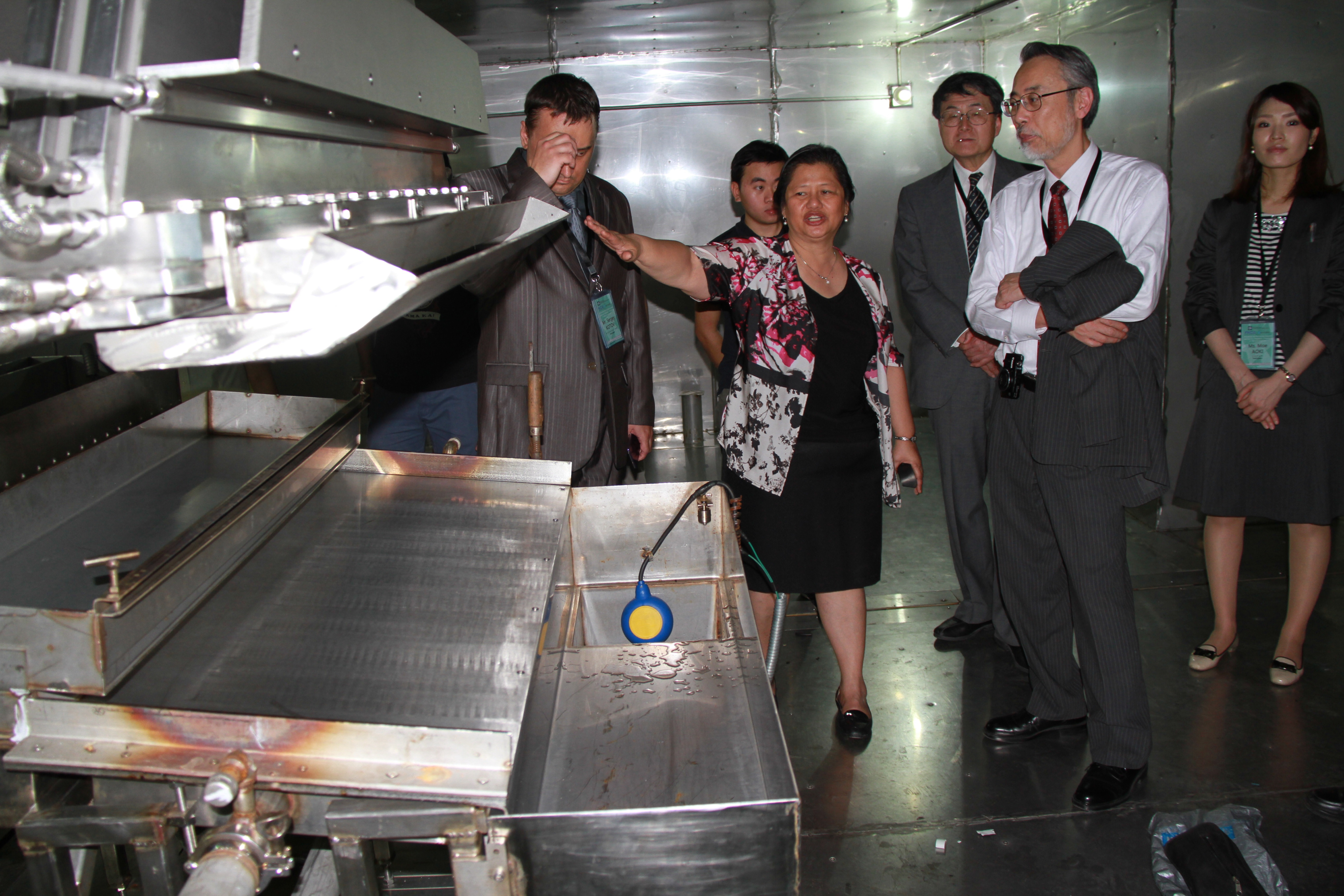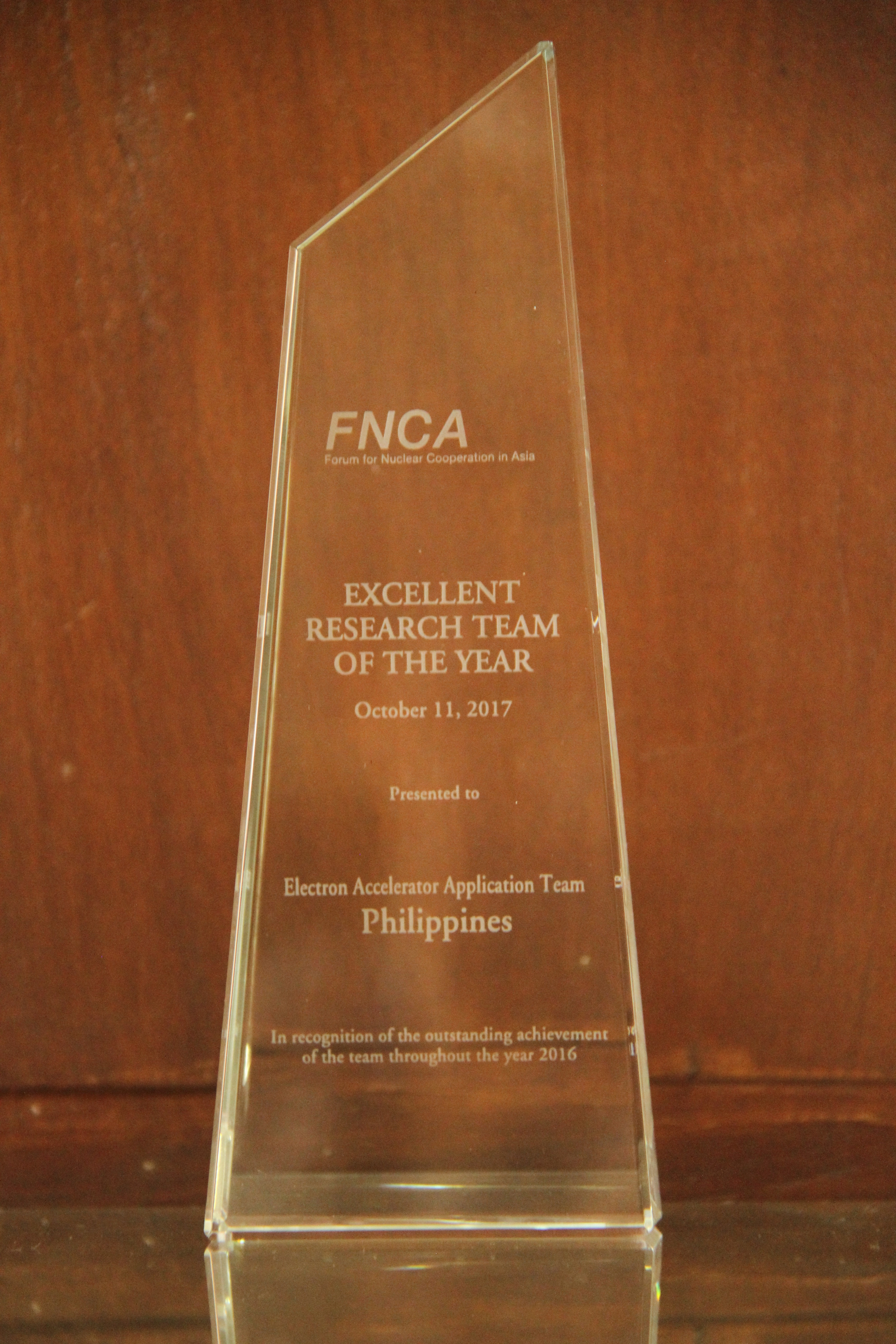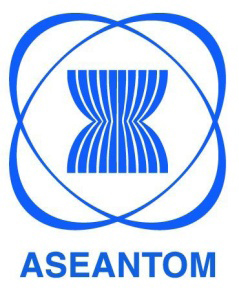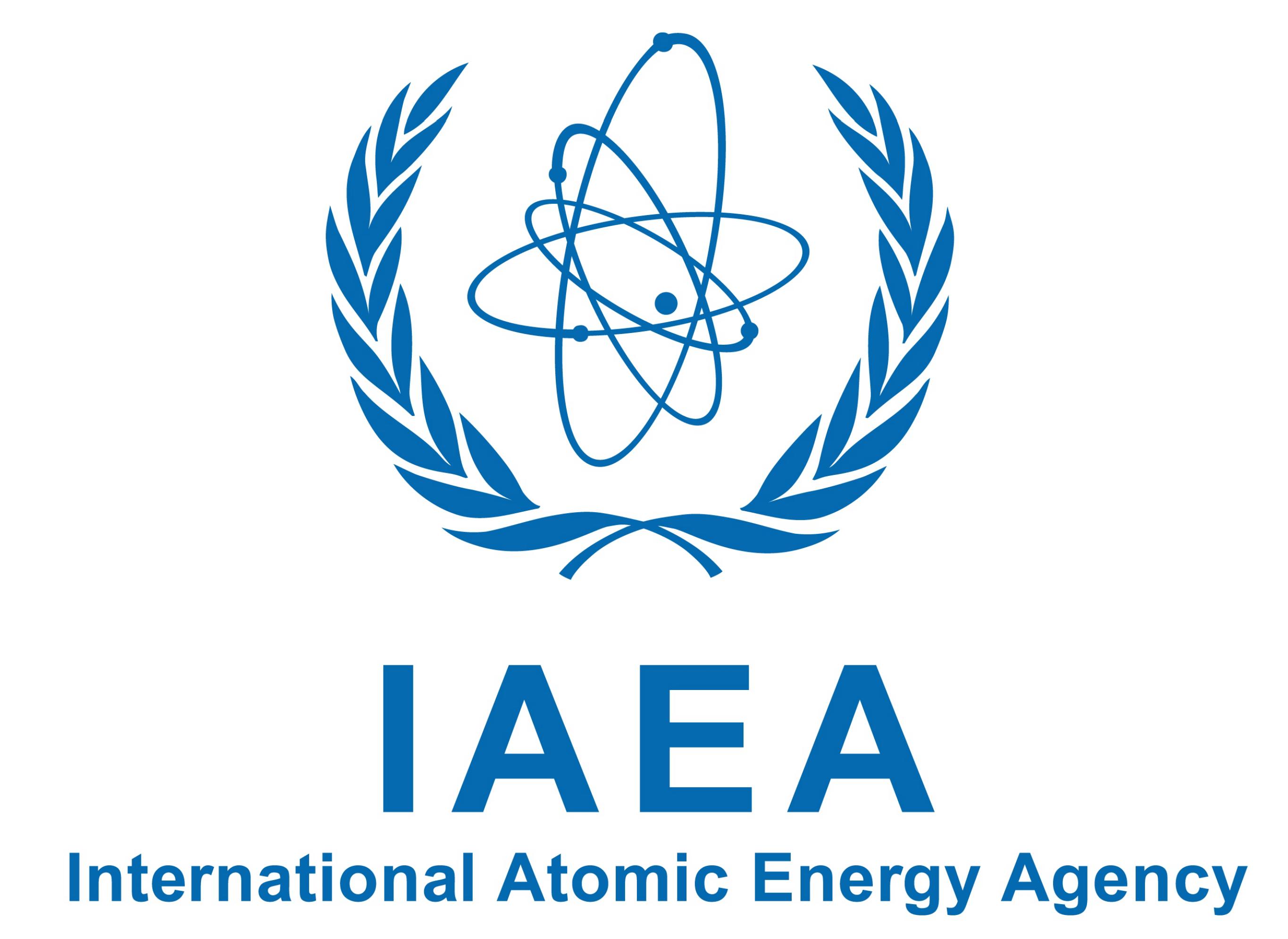Filipino Plant Formula Wins Japanese Excellence Award
- Details

Dr. Lucile Abad, who headed the Plant Food Supplement (PFS) project, demonstrated the E-beam applications for radiation processing of the PFS to experts and participants in a seminar by the Forum for Nuclear Cooperation in Asia (FNCA) held in the Philippines. The liquid handling system was designed and fabricated by the PNRI Irradiation Services Section.


Left: The Plant Food Supplement (PFS) developed by PNRI scientists and researchers
Right: The FNCA Excellent Research Team of the Year Award for 2017
Filipino Plant Formula Wins Japanese Excellence Award
The Japanese government, through the Forum for Nuclear Cooperation in Asia (FNCA), has awarded the project team behind the Plant Food Supplement (PFS) of the Department of Science and Technology – Philippine Nuclear Research Institute (DOST-PNRI) with the 2017 FNCA Excellent Research Team of the Year Award for its success in radiation technology applications.
The award was granted on October 11, 2017, in time for the 18th FNCA Ministerial Level Meeting in Astana, Kazakhstan this year. The FNCA is a Japan-led cooperation framework for the peaceful applications of nuclear technology. Among the participating countries in the FNCA are Australia, Bangladesh, China, Indonesia, Japan, Kazakhstan, Korea, Malaysia, Mongolia, The Philippines, Thailand and Vietnam.
The research team was led by Career Scientist Dr. Lucille Abad who heads PNRI’s Chemistry Research Section, which spearheaded the development of the PFS to greatly contribute to Filipino agricultural development and food security, as well as to help mitigate the effects of El Niño and climate change that ravages farmlands in the countryside.
With just 3.2 liters per hectare of water mixed with the right proportion of the PFS, the formulation was proven effective in increasing the yield of rice, mungbean and other crops by over 20 percent. The field tests also demonstrated the improved resistance of rice applied with PFS against the rice tungro bacilliform virus infestation as well as bacterial leaf blight. In some instances, the fields sprayed with PFS withstood a violent storm better than the surrounding fields without it.
These PFS were made from natural polymers such as carrageenan, a common industrial ingredient extracted from seaweeds. Irradiation degrades these polymers to form natural bioactive agents that can improve the health and increase the growth and yield of various crops. The carrageenan used for the PFS was irradiated at PNRI’s state-of-the-art Electron Beam Irradiation Facility in Diliman, Quezon City, the first facility of its kind in the country dedicated to semi-commercial services.
After successful field experiments on rice has proven its superb advantages, the PFS project was officially launched in November 2015. The following month, DOST started the widespread testing of PFS in Luzon, Panay Island, Zamboanga and Davao.
To this end, PNRI produced more than several tons of PFS since 2015. The products were distributed to thousands of hectares of ricefields in selected provinces of Regions 2 and 3 – in Tuguegarao, Cagayan, Ilagan, Isabela and in Pulilan, Bulacan.
The development of the formula began under a cooperative project with the International Atomic Energy Agency (IAEA) back in 2009. The PFS project was funded by the Philippine Council for Agriculture, Aquatic and Natural Resources (PCAARRD), while the field trials were co-implemented under Dr. Gil Magsino of the National Crop Protection Center of the University of the Philippines - Los Baños (UPLB).
ASEANTOM for Stronger Nuclear Safety, Security and Safeguards in Southeast Asia
- Details

ASEANTOM for Stronger Nuclear Safety, Security and Safeguards in Southeast Asia
Addressing the need for stronger cooperation in Southeast Asia in the field of nuclear regulations, the member states of the Association of Southeast Asian Nations (ASEAN), including the Philippines, embarked on the establishment of the ASEAN Network of Regulatory Bodies on Atomic Energy (ASEANTOM).
ASEANTOM aims to strengthen nuclear safety, security, and safeguards by enhancing cooperation and complementing the work among the ASEAN countries with the existing mechanisms at the national, regional, and international levels.
The countries participating in the ASEANTOM are Brunei Darussalam, Cambodia, Indonesia, Laos, Malaysia, Myanmar, Philippines, Singapore, Thailand and Vietnam.
With the invaluable support of the International Atomic Energy Agency (IAEA), the effort to establish the ASEANTOM was spearheaded in 2011 by the Office of Atoms for Peace (OAP), which currently serves as Thailand’s nuclear regulatory body.
Since its official founding in 2013, the ASEANTOM has already worked towards improving the coordination and capabilities of the ASEAN regulatory bodies. ASEANTOM member states have hosted several technical meetings, seminars and workshops in Thailand, Malaysia, Singapore and Austria from 2013 to 2017.
Among the topics and issues addressed by ASEANTOM include nuclear forensics, radiation biodosimetry and metrology, environmental radiation monitoring, inter-agency networks, public communication, and nuclear emergency preparedness and response in general.
The Philippines will host the 4th Annual ASEANTOM Meeting and Technical Session on Nuclear Security on December 7 to 8, 2017 at the Crowne Plaza Manila Galleria in Quezon City.
International Student Competition - IAEA Third International Conference on Human Resource Development for Nuclear Power Programmes
- Details


The International Atomic Energy Agency (IAEA) will hold the Third International Conference on Human Resource Development for Nuclear Power Programmes: Meeting Challenges to Ensure the Future Nuclear Workforce Capability from May 28-31, 2018 in Gyeongju, Republic of Korea.
The conference is directed at a broad range of experts in the area of capacity building, human resource development, education and training, knowledge management and knowledge networks for nuclear power programmes, and will review across the facility and worker lifecycle the current state of nuclear human resource development including nuclear education and training and will address issues such as availability and opportunities for sharing of relevant infrastructure.
In conjunction with the conference, the IAEA is also holding an International Student Competition to foster the younger generation’s interest in nuclear science and technology.
Students (aged 14-18 and currently enrolled in secondary schools) are invited to promote discussion and raise awareness on the current or future impacts and applications of nuclear science and technology in our lives. Students who design and implement the most innovative projects will be eligible for a trip to the Republic of Korea, to present at the conference, visit local schools and institutions, and attend cultural events.
The contestants will participate as part of a team of at least 3 students. The deadline for submission of abstracts is on December 1, 2017. The IAEA will notify the shortlisted participants on December 20, 2017, after which they will be required to submit a project summary in the form of a 3-minute video or digital media presentation on or before the midnight of March 2, 2018. The five finalist teams to be chosen will be given the opportunity to present their projects at the conference itself.
Read more at: https://www.iaea.org/events/human-resource-development-conference-2018
The Competition Guidelines and Submission form may be found here: http://www-pub.iaea.org/iaeameetings/56047/Third-International-Conference-on-Human-Resource-Development-for-Nuclear-Power-Programmes-Meeting-Challenges-to-Ensure-the-Future-Nuclear-Workforce-Capability
Mango Weevil Research Team Wins the National Award for the Presidential Lingkod Bayan Group Category
- Details

The Presidential Lingkod Bayan awardees pose with President Rodrigo Roa Duterte, CSC Chairperson Alicia dela Rosa-Bala, and CSC Commissioner Robert S. Martinez (1st row, middle), and committee members Jarius Bondoc and Deborah Sy (rightmost), among them Scientist I, Mango Weevil Research Team Leader and PNRI Agriculture Research Section Head Ms. Glenda Obra (1st row, 5th from left), PNRI Irradiation Services Section Head Ms. Luvimina Lanuza (1st row, 4th from left) and PNRI Science Rsearch Specialist Mr. Sotero Resilva (2nd row, rightmost). They were joined by Mango Weevil Research Team Leader Dr. Louella Rowena Lorenzana of the Department of Agriculture (DA) (1st row, 6th from left). Photo courtesy of the Civil Service Commission. Published in Manila Bulletin, October 3, 2017.
Researchers under the Mango Weevil Research Team from the Department of Science and Technology – Philippine Nuclear Research Institute (DOST-PNRI) and the Department of Agriculture (DA) were finally honored in Malacañang as the national awardees of the 2017 Presidential Lingkod Bayan Award for the group category by no less than President Rodrigo Roa Duterte at the Rizal Hall of Malacañan Palace on September 20, 2017.
The awardees from PNRI are Ms. Glenda Obra, Scientist I and head of the Agriculture Research Section, along with Mr. Sotero Resilva, Science Research Specialist, and Ms. Luvimina Lanuza, head of the Irradiation Services Section. Also among the national awardees are their project counterparts from DA, namely Dr. Louella Lorenzana, Mr. Edison Bauzon and Ms. Elvira Litan.
The research team was selected from among several Presidential Lingkod Bayan regional awardees under the Civil Service Commission (CSC) Honor Awards Program for 2017.
See: http://www.pnri.dost.gov.ph/index.php/2-uncategorised/504-pnri-researchers-win-the-presidential-lingkod-bayan-regional-award












































